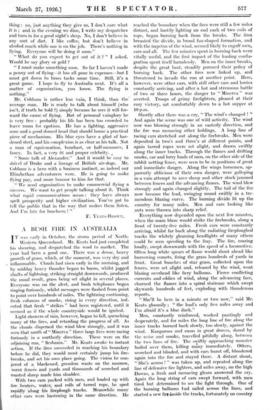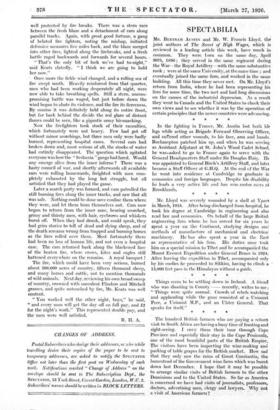- A BUSH FIRE IN AUSTRALIA IT was early in
October, the storm period of North- -1- Western Queensland., Mr. Keats had just completed his shearing, and despatched the wool to market. The year had been a good one. There was a dense, heavy growth of grass, which, at the moment, was very dry and . inflammable. Clouds had risen early in the morning, and by midday heavy thunder began to boom, whilst jagged shafts of lightning, striking straight downwards, produced the usual result, grass being set alight in several places. Everyone was on the alert, and bush telephones began ringing furiously, whilst messages were flashed from point to point over hundreds of miles. The lightning continuing, fresh columns of smoke, rising in every direction, ind- ented that fresh " strikes " had been registered, until it seemed as if the whole countryside would be ignited. .
Light showers of rain, however, began to fall, quenching many of the fires, and retarding the progress of all. As the clouds .dispersed the wind blew strongly, and it was seen that south of " Minerva " three large fires were racing furiously in a northerly direction. These were on the adjoining run, " Sesbania." Mr. Keats awoke to instant action. If the fires succeeded in reaching his boundary before he did, they would most certainly jump his fire- breaks,. and set his own place going. The vision he con- jured of : a blackened, grassless waste on the morrow, burnt fences and yards and thousands of scorched and roasted sheep made him shudder. With two cars packed with men, and loaded up, with fire beaters, water, and rolls of tarred rope, he sped vapidly along his fireplough tracks. Meanwhile many other cars were hastening in the same direction. He reached the boundary when the fires were still a few miles distant, and hastily lighting an end each of two coils of rope, began burning back from the breaks. The fires breasted the divide, in broad fan-shaped formation, and with the impetus of the wind, seemed likely to engulf men, cars and all. The few minutes spent in burning back were vitally useful, and the first impact of the leading confla- gration spent itself harmlessly. Men on the inner breaks, despite the great heat, steadily pursued their policy of burning back. The other fires now linked up, and threatened to invade the run at another point. Here, however, were other cars, with still other cars and lorries constantly arriving, and after a hot and strenuous battle of two or three hours, the danger to " Minerva " was averted. Troops of grimy firefighters, pleased at their easy victory, sat comfortably down to a hot supper at 10 p.m.
Shortly after there was. a cry, " The wind's changed ! And again the scene was one of wild activity. The wind now was blowing strongly in an easterly direction, and the fire was menacing other holdings. A long line of racing cars stretched out along the firebreaks. Men were deposited in two's and three's at different points, and again tarred ropes were set alight, and drawn swiftly along the inner tracks. Through the flames and drifting smoke, car and lorry loads of men, on the other side of the rabbit netting fence, were seen to be in positions of great and immediate danger. Along the wings horsemen, ap- parently oblivious of their own danger, were galloping in a vain attempt to save sheep and other stock jammed between fences and the advancing flames. The wind.blew strongly and again changed slightly. The tail of the fire now became the lead, swinging round swiftly in a tre- mendous blazing curve. The burning divide lit up the country for many miles. Men and cars looking like ants were thrown into sharp relief.
Everything now depended upon the next few minutes, when the main blaze would strike the firebreaks, along a front of twenty-five miles. Fresh cars were constantly arriving, whilst far back along the radiating fireploughed tracks the whitely gleaming headlights of many others could be seen speeding to the fray. The fire, roaring loudly, swept downwards with the speed of a locomotive. Often long white spears of flame would shoot ahead like burrowing comets, firing the grass hundreds of yards in front. Great bunches of star grass, collected upon the fences, were set alight and, released by the wind, went blazing overhead like fiery balloons. Fierce conflicting currents and eddies of wind, along the advancing face, churned the flames into a spiral staircase which swept skywards hundreds of feet, exploding with thunderous reports. " She'll be here in a minute or two :now," said Mr. Keats gloomily ; " the lead's only five miles away and I'm afraid it's a blue duck."
Men, constantly reinforced, worked pantingly and desperately, and for miles the long line of fire along the inner tracks burned back slowly, too slowly, against the wind. Kangaroos and emus in great droves, dazed by the noise and smoke, travelled pitifully along, between the two lines of fire. The swiftly approaching monster boiled over them, killing many immediately. Others, scorched and blinded, and with ears burnt off, blundered again into the. fire and stayed there. A distant shout, " She's across ! " was taken up, and repeated along the line of defensive fire lighters,.and miles away, on the high Downs, a fresh and menacing gleam answered the cry. Again the Jong string of cars. swept forward, with men tired but determined to see the fight through. One of the burning balloons had sailed across the lines, and' started started a new fir: inside the tracks, fortunately on country well protected by fire breaks. There was a stern race between the fresh blaze and a detachment of cars along -parallel tracks with eat ood fortune a n . gain gr g gang of belated fire fighters, noting the mishap, initiated defensive measures five miles back, and the blaze merged into other fires, lighted along the firebreaks, and a fresh battle raged backwards and forwards for several hours.
" That's the only bit of luck we've had to-night," said Keats elatedly. " I think we are going to hold her now." - ' Once more the fickle wind changed, and a rolling sea of fire swept south. Heavily reinforced from that quarter, men who had been working desperately all night, were now able to take breathing spells. Still a stern, uncom- promising battle was waged, but just before dawn the wind began to abate its violence, and the fire its fierceness. By sunrise it was definitely held along its entire front, but far back behind the divide the red glare of distant flames could be seen, like a gigantic army bivouacking. Now the firefighters took stock of their casualties, which fortunately were not heavy, Few . had got. off without minor scorchings, but three men only were badly burned, representing hospital cases. Several cars had broken down and, most serious of all, the stocks of water had entirely disappeared. Thd question which agitated everyone was howthe " Sesbania "gangs had fared. Would any emerge alive from the inner inferno ? There was a hasty council of war, and shortly afterwards all available cars were rolling homewards, freighted with men com- pletely exhausted by the long hot struggle, but all satisfied that they had played the game.
Later a search party was formed, and cars patrolled the still burning fires along the inner tracks, and saw that all Was safe. - Nothing could be done save confine them where they were, and let them burn themselves out. Cars now began to return from the inner zone, bearing scorched, grimy and thirsty men, with hair, eyebrows and whiskers burnt off. When they had drunk, and could speak, they had grim stories to tell of dead and dying sheep, and of the death screams wrung from trapped and burning horses as the fires rolled over them. Most fortunately there had been no, loss of human life, and not even a hospital case. The cars returned back along the blackened face of the beaten fire, where crows, kites and eagles still battened everywhere on the remains. A royal banquet ! The fire, which could have been very serious, burned about 500,000 acres of country, fifteen thousand sheep, and many horses and cattle, not to mention thousands of wild animals.' Next day, reviewing his own broad sweep of country, crowned with succulent Flinders and Mitchell grasses, and quite untouched by fire, Mr. Keats was well content. . .
" You worked well the other night, boys," he said, " and every man will get the day off on full pay, and £2 for the night's work." This represented double pay, and the men were well satisfied.
R. II. A.























































 Previous page
Previous page